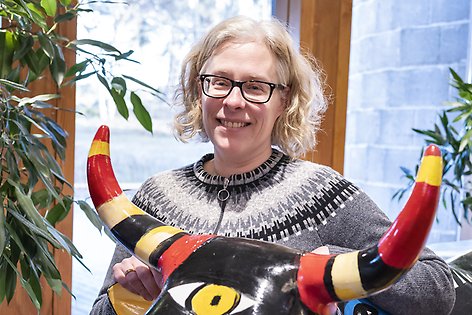The importance of sustainable livestock production for human health – Interview with Ylva Persson
We have interviewed Ylva Persson, the assistant state veterinarian in ruminant diseases at the National Veterinary Institute (SVA) and associate professor at the Swedish University of Agricultural Sciences (SLU) In this interview, Ylva shares her reflections on the importance of sustainable livestock production in light of emerging civil crises and the importance of flexibility and adaptability to achieve sustainable food production, promoting human and animal health.

Ylva Persson, PhD, Associate State Veterinarian and Associate Professor, Departement of Animal Health and Antimicrobial Strategies, National Veterinary Institute (SVA). Photo: Göran Ekeberg
At the upcoming October Summit, Dr. Ylva Persson, Assistant state veterinarian, National Veterinary Institute, organises the workshop Sustainable Animal Production in War and Peace together with Sigrid Agenäs, a professor at the Department of Animal Nutrition and Management at SLU and the leader of SustAnimal.
I work with infectious diseases in ruminants, and my research focuses on mastitis and antibiotic use and has partly been carried out in low-income countries. The driver of my work is also the vision of SVA; healthy animals and safe people. Healthy animals will contribute to many positive aspects of food production; better animal welfare, increased productivity, lower carbon footprint, decreased use of antibiotics, more profitable farming and safer food", says Ylva Persson.
When we planned for the workshop, we knew that we wanted to address the importance of sustainable livestock production for the health and well-being of humans. We wanted to emphasise how grazing animals (mainly ruminants) can contribute to farmers’ livelihoods, the safe and nutritious food supply, biodiversity, and open landscapes, but without negative impacts on animal welfare, climate, and antibiotic use. When Russia invaded Ukraine, it suddenly became clear that the preparedness perspective needed attention. Livestock keeping needs to be flexible and adaptive for sustainable food production in peace AND war (or other crisis and changes), Dr. Persson continues.
In your opinion, what is the leading public health concern in relation to food systems, and what needs to be done to achieve sustainable, equitable food systems promoting our health?
Many public health concerns need to be overcome. In many low-income countries, animal diseases that cause impaired productivity and loss of animals will lead to starvation, poverty, child stunting, and higher risks of conflicts between groups of people, regions, etc. Infectious diseases will also increase the risk of food-borne diseases and the emergence of antibiotic-resistant bacteria. Globally, one of the main concerns of livestock is the negative impact on the climate and environment. One of the most critical factors for safe and sustainable livestock production is to keep the animals healthy. Healthy animals will produce more per animal unit, and fewer animals are needed to maintain or even increase therefore required production. Accordingly, healthy animals are also more climate-friendly. Moreover, healthy animals will reduce the demand for antibiotics, decrease the risk of food-borne pathogens, and increase farm profitability. We take safe and affordable food for granted in our part of the world. Most consumers are probably not aware of how the longstanding efforts for eradicating and controlling animal diseases have led to the favourable situation we see in Sweden, where food is safe, available, and affordable, says Ylva Persson.
What are your expectations for Uppsala Health Summit 2022 and your involvement?
With this workshop, we hope to raise awareness of the role of livestock in a sustainable and flexible food chain. In light of the war in Ukraine, we want to make sure that the preparedness perspective is not forgotten. Since the workshop will gather people with many different backgrounds, we hope to get constructive and innovative input on how animal production can be flexible and adaptive in times of change and yet sustainable in all aspects mentioned above", says Persson.
Can you tell us about an ‘Aha moment’ that you have had in your research?
I think one ‘aha-moment’ was that when we organised this workshop, at the same time, the war in Ukraine broke out. What we previously had been doing felt suddenly so ‘fuzzy’ but at the same time very critical. The paradox was that the outbreak of war gave me new energy and made my daily work even more meaningful. Our daily work for healthy and reproductive animals ended up in a new light. The food supply has to function and be profitable in times of peace but at the same time cope with a crisis - and that without compromising on animal welfare and the environment. I believe we can meet that challenge if we are aware, flexible and adaptable. However, we can’t wait until the crisis comes, we have to start now! This applies not only to Sweden but is very much a global issue. It does not have to be about an armed conflict but can be about climate change, natural disasters, pandemics, or changing politics", says Dr. Ylva Persson.
